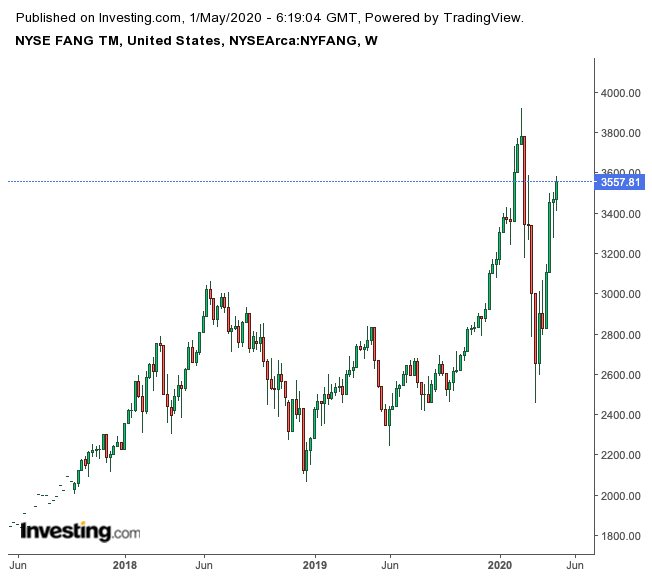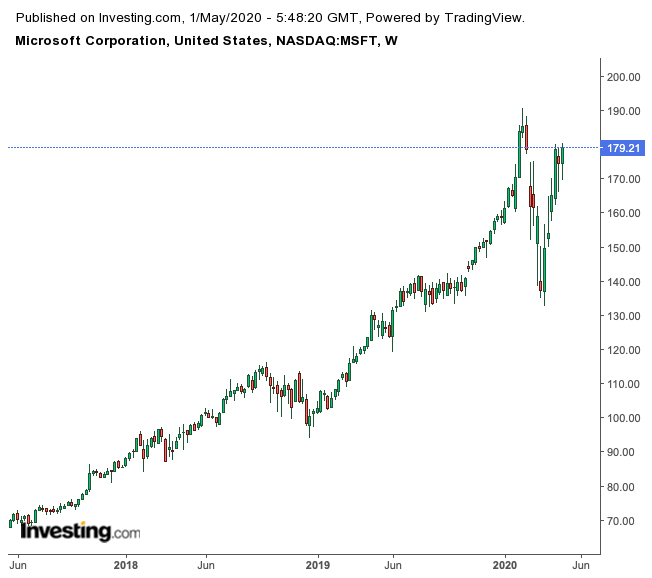Sticking With Mega Cap Stocks, Including These 3, Should Prove A Winning Bet
Investing.com | May 01, 2020 04:37AM ET
A bit over a month ago, equity markets were being hammered. In just 22 days, beginning in late February, the S&P 500 dropped by 30%, the fastest decline in market history.
But stocks are on their way back up again. And much like previous rallies in recent years, it’s looking like mega technology stocks are leading the way.
Stocks on the so-called “FANG” index, which includes tech behemoths such as Facebook (NASDAQ:FB), Amazon (NASDAQ:AMZN) and Netflix (NASDAQ:NFLX), are faring much better this year than the broader S&P 500 benchmark.

The NYSE FANG+TM Index (NYFANG) has surged more than 15% in 2020, while over the same period, the SPX is down about 9%. For the past 12 months, these tech stocks have delivered 30% returns.
Some of the latest earnings reports show that the world’s largest technology companies are well positioned to manage through the COVID-19-induced recession. Even more encouraging, they'll emerge much stronger once things get back to normal. Below, we focus on three big tech companies whose recent earnings releases are fueling additional gains in their stocks as investors seek refuge in their safety.
1. Microsoft
Software and devices giant Microsoft (NASDAQ:MSFT) is thriving despite the extreme economic distress coronavirus has brought to many sectors of the economy. Currently the world’s most valuable publicly traded company, the Redmond, WA-based behemoth on Wednesday reported strong growth in quarterly sales and profit. The business is benefiting from the shift to more activities online as the coronavirus pandemic forces millions globally to shelter at home.
Sales rose 15% in the first three months of the year to $35 billion. Microsoft generated a net profit of $10.75 billion, beating analyst estimates.

“As Covid-19 impacts every aspect of our work and life, we’ve seen two years’ worth of digital transformation in two months,” Microsoft Chief Executive Satya Nadella said during the post-release call.
The health crisis has pushed more workers to use Microsoft’s workplace collaboration software suite, called Teams, that includes videoconferencing and messaging functions. It now has 75 million daily active users—more than double the number in early March.
Cloud-computing, which has been the main growth driver for Microsoft, has gained added importance for customers, partly because more and more employees are working from home. That helped drive a 59% jump in sales in the Azure cloud business during the latest period, according to Microsoft.
Trading at $179.21 a share, Microsoft stock is up about 14% this year and 38% in the past 12 months.
2. Facebook
Social media giant Facebook (NASDAQ:FB) also surprised analysts when it released its earnings report on Wednesday. The company's sales beat forecasts as the business held steady in the first few weeks of April after it faced a steep decline in March.
Facebook relies heavily on advertising revenue from travel and entertainment businesses, which have been decimated by the global lockdown measures still in place. But that stay-at-home environment is also driving more user-engagement, boosting the company's future prospects.
Daily users of all Facebook’s apps, including Instagram and WhatsApp, averaged 2.36 billion in March, up from 2.26 billion in December, the company said. Facebook’s core social network now has 1.73 billion daily users, compared with 1.66 billion during the final month of 2019.
That proliferation of the company’s messaging products could pay off in the near future, mitigating the decline in advertising sales if the slump in the economy endures.
After the better-than-feared earnings were announced, investors sent Facebook shares higher by 5% on Wednesday. The stock closed at $204.71 on Thursday; it's up about 5% in the past 12 months.
3. Alphabet
Alphabet (NASDAQ:GOOGL) also reported first quarter results this week that beat analysts forecasts. The Google parent showed the company’s cloud and YouTube businesses kept growing in the midst of the COVID-19 pandemic.
Sales rose 14% to $33.71 billion from a year ago, led by YouTube revenue that jumped 33.5% and Alphabet’s cloud-computing segment where sales soared 52%.
“Results came out better than the market expected, with strong metrics in Google Cloud and YouTube,” Jason Bazinet, an analyst at Citigroup, wrote in a note to clients.
Google’s diversified business model is better positioned to weather the economic downturn, even if potential advertisers continue slashing their marketing budgets.
Chief Executive Officer Sundar Pichai said the cloud business was still strong, even if some deals were taking longer to complete. “We see overall momentum,” he told analysts during a conference call.
Google shares are almost unchanged for the year, closing last night at $1,346.70, up 3.5% during the past one year.
Bottom Line
While these companies aren't totally immune from the pandemic's impact, their latest earnings reports show they're still relatively insulated, making them the safest bets for investors when so much uncertainty remains.
Trading in financial instruments and/or cryptocurrencies involves high risks including the risk of losing some, or all, of your investment amount, and may not be suitable for all investors. Prices of cryptocurrencies are extremely volatile and may be affected by external factors such as financial, regulatory or political events. Trading on margin increases the financial risks.
Before deciding to trade in financial instrument or cryptocurrencies you should be fully informed of the risks and costs associated with trading the financial markets, carefully consider your investment objectives, level of experience, and risk appetite, and seek professional advice where needed.
Fusion Media would like to remind you that the data contained in this website is not necessarily real-time nor accurate. The data and prices on the website are not necessarily provided by any market or exchange, but may be provided by market makers, and so prices may not be accurate and may differ from the actual price at any given market, meaning prices are indicative and not appropriate for trading purposes. Fusion Media and any provider of the data contained in this website will not accept liability for any loss or damage as a result of your trading, or your reliance on the information contained within this website.
It is prohibited to use, store, reproduce, display, modify, transmit or distribute the data contained in this website without the explicit prior written permission of Fusion Media and/or the data provider. All intellectual property rights are reserved by the providers and/or the exchange providing the data contained in this website.
Fusion Media may be compensated by the advertisers that appear on the website, based on your interaction with the advertisements or advertisers.